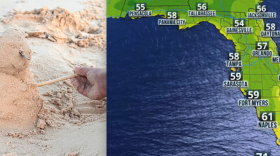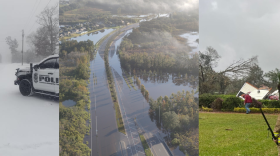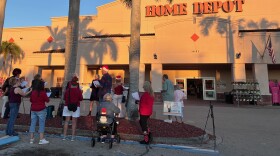STEVE INSKEEP, HOST:
Quilters in Gee's Bend, Ala., turn textiles into art. It's a skill they've passed down through generations. Museums and galleries across the United States collect the work from this one town, and the quilters are finding ways to bring rewards to the whole community. Troy Public Radio's Kyle Gassiott picks up the thread.
KYLE GASSIOTT, BYLINE: It's February, but, as usual, spring has come early to the town of Gee's Bend, Ala. The sun is shining outside.
(SOUNDBITE OF SEWING MACHINE WHIRRING)
GASSIOTT: And inside the quilters collective house, an artist is at work connecting fabric in different designs for her latest piece.
MARY ANN PETTWAY: I'm making my quilts to hang on the wall. I don't make quilts to put on the bed. If they want to use it on the bed, that's up to them.
GASSIOTT: Mary Ann Pettway manages a collective of around 30 quilters. She's been making quilts since her mother convinced her to sit still long enough to learn.
M A PETTWAY: No, I wanted to play. I didn't want to be doing no stuff like this.
GASSIOTT: Decades later, Mary Ann's quilts have hung in major galleries across the country. Her most famous quilt is Robot in the White House, a queen-size quilt with abstract patterns of red and white fabric, and she frequently works on commission, like the quilt she's making today.
The story of Gee's Bend - a town of a little over 200 on the Alabama River - and the quilters is an old one. Most of the residents are descended from the enslaved people who worked on a plantation that was owned by a man named Pettway. Today the Pettway name is still prominent in the region. After emancipation, the economy of the town struggled. At one point, historian Richard Bailey says the temporary removal of the local ferry virtually isolated Gee's Bend from the world.
RICHARD BAILEY: You take away the ferry, you've taken away from a poor person everything that person might have had that would have led to him or her becoming affluent.
GASSIOTT: But the quilters kept sewing. And in the 1960s, encouraged by Martin Luther King Jr., some of them joined the Freedom Quilting Bee. The bee sold quilts and designs to wealthy patrons like CBS executive Bill Paley and his wife, Babe. Gail Andrews, former director of the Birmingham Museum of Art, says this marked a sea change in the community.
GAIL ANDREWS: For the first time, these women and their families in this very impoverished area had some income, as well as greater self-esteem about their work and what their work meant.
GASSIOTT: Mary Margaret Pettway says that in the 1970s, her mother could often pay the light bill with the $75 she would get from a quilt sale. In the 1990s, an art collector saw the qualities of abstract art in the quilt designs. This led to shows in major museums across the country. The recognition helped put Gee's Bend on the map. But Mary Margaret says, in the past, it didn't readily translate to larger financial gains.
MARY MARGARET PETTWAY: So every once in a while, we're discovered, and they'd get a few quilts, and they'd go out and say, well, we're going to bring y'all some business back, and it pretty much never happened.
GASSIOTT: Today Mary Margaret sells her quilts with designs inspired by nature through her Etsy shop and collaborates with LA-based designer Greg Lauren.
QUESTLOVE: I'm here representing Greg Lauren and Gee Bend quilters.
GASSIOTT: The musician and director Questlove wore clothing with Gee's Bend designs to both the Oscars in 2022, when he won best documentary, and the Met Gala that same year. At times, the quilters collaborate and market their work together. They also create and sell work individually on Etsy. Since 2019, they've worked with Nest, a nonprofit group that helps female artists generate revenue. They set up 21 Etsy shops together that have brought 670,000 in revenue to a community where the median annual income was listed around $16,000 in the last census.
Some of the quilters recently partnered with Target in February for Black History Month. Their designs were stitched onto apparel and items such as pillows and printed on tumblers. Target did not respond to repeated interview requests with information about the partnership. Quilter Stella Pettway says the collaborations and Etsy sales are off to a good start, but consistency is needed to truly see a large return.
STELLA PETTWAY: If the work slows down, that means the money goes down. We need the collaboration to continue coming on, and our commission work.
GASSIOTT: Bailey says the quilts help to tell the Gee's Bend story to a larger audience.
BAILEY: Those images are autobiographical. They represent the experiences of the person who did those quilts.
(SOUNDBITE OF SEWING MACHINE WHIRRING)
GASSIOTT: Working in one afternoon, Mary Ann Pettway sews quilt panels together in an abstract design, bright geometric panels in red, yellow, green, white and purple.
M A PETTWAY: It just makes me feel good just sit there and make something that somebody want, and they get to love it.
GASSIOTT: And another commission means Mary Ann Pettway can continue to do what she loves.
For NPR News, I'm Kyle Gassiott in Gee's Bend, Ala. Transcript provided by NPR, Copyright NPR.
NPR transcripts are created on a rush deadline by an NPR contractor. This text may not be in its final form and may be updated or revised in the future. Accuracy and availability may vary. The authoritative record of NPR’s programming is the audio record.






